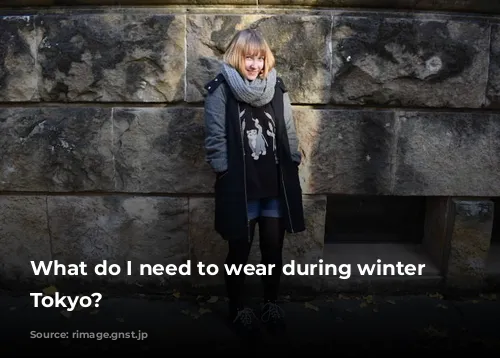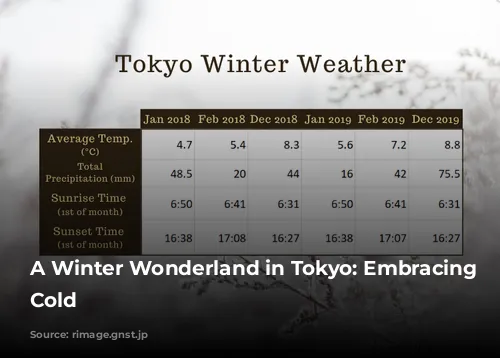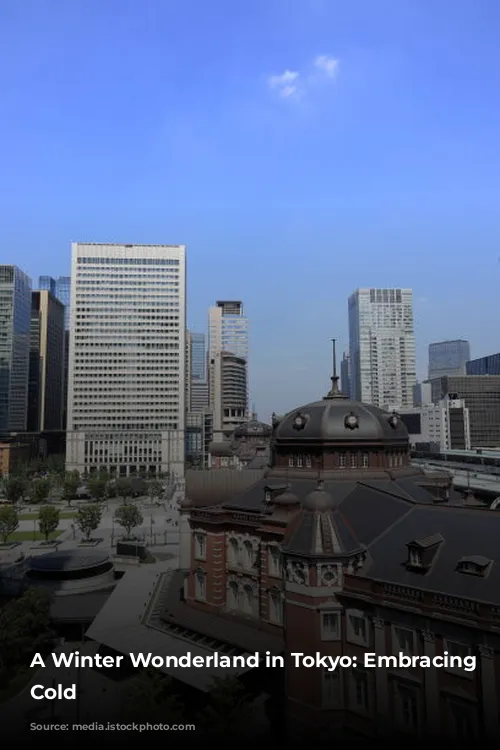Planning a winter escapade to Tokyo? Buckle up for an exciting adventure, but be sure to pack your warmest layers! Although Tokyo doesn’t experience extreme winter temperatures like other parts of Japan, the cold, crisp air and occasional snowfall will definitely make you feel the winter chill.
Let’s delve into the monthly weather patterns and discover how Tokyo’s climate evolves from December to February.

A Seasonal Guide to Tokyo’s Winter
As autumn fades into winter, December in Tokyo marks a transition to cooler temperatures. The average high hovers around 56°F (13.4°C), while the average low dips to 42°F (5.8°C). Keep in mind, the temperature difference between day and night is quite drastic so be prepared for a chilly evening after a pleasant afternoon.
January is Tokyo’s coldest month, with the average high dipping to 50°F (10.2°C) and the average low plummeting to 35°F (1.8°C). This month, you might even experience snowfall.
Although February signals the end of January’s frigid grasp, chilly days are still common, so don’t be surprised if a flurry of snow graces the city. However, a hint of spring begins to emerge towards the end of the month, with warmer temperatures on the horizon.

Understanding Tokyo’s Winter Climate
Tokyo’s winter weather is shaped by a cold northwest wind that sweeps across the Sea of Japan. As the wind travels over the sea, the water vapor transforms into snow, resulting in significant snowfall in West Japan. The wind then blows over the mountains of Honshu, the largest of Japan’s main islands, drying out before reaching Tokyo. This results in dry winter air in Tokyo, with minimal snowfall. However, this dry air can wreak havoc on your skin, so be sure to pack lip balm and hand lotion to combat dry skin and chapped lips.
Also, remember that sunsets happen earlier than usual during winter, so adjust your sightseeing plans accordingly.

Staying Warm and Cozy in Tokyo’s Winter
To conquer the chill of Tokyo’s winter, layering your clothing is key. It’s a smart move because you can quickly remove layers when stepping into a heated building. Pack gloves, a scarf, and a knit cap to protect yourself from the cold.
Here’s a quick breakdown of essential winter wear for Tokyo:

Top-to-Bottom Winter Wear
Head: Protect your head and ears from the cold, dry wind with a knit hat or ear warmers, and a muffler. Don’t forget, face masks not only prevent infections but also help to moisturize your skin and lips by trapping the moisture from your breath.
Upper Body: A lined, windproof coat is a must, ideally worn over a warm yet thin sweater. Down jackets and wool coats are excellent choices in late December, while bulky coats can be a hassle to carry around indoors. Don’t forget those gloves!
Lower Body: Choose thick wool tights and pants or lined leggings (toasties) for warmth and wind protection. Jeans lovers can add an extra layer of warmth with thin tights underneath.
Socks & Shoes: Look for heat-retaining and comfortable socks and lined shoes or boots. Prepare for a lot of walking, so prioritize comfort.

Winter Essentials: Battling the Cold
Here are some additional tips and tricks to make your winter journey comfortable:
1) Thermos Flask: Stay warm from the inside out with a thermos filled with hot tea or other beverages.
2) Lip Balm and Hand Lotion: Dry winter air can cause chapped lips and rough skin. Pack lip balm and hand lotion for immediate relief.
3) Kairo (Hand Warmers): Kairo are essential for cold days. These readily available hand warmers come in various shapes and sizes, from classic handhelds to ones that can be attached to your socks, shirts, or pants.

Japanese Wisdom for Staying Warm
The Japanese have their own unique strategies for combating Tokyo’s winter chill. Here are a few of their favorites:
● Layered Warmth: This classic layering technique involves wearing breathable undergarments that retain body heat. These are readily available at affordable prices.
● “Cold Comes from the Feet”: The Japanese believe keeping your feet warm is vital for staying warm overall. Invest in warm socks and lined leggings, and consider layering socks when it’s exceptionally cold.
● Masks Against the Cold: Face masks provide warmth for your nose and lower face, while also moisturizing your skin and throat. They can also help ward off winter colds and the flu.
● Smartphone-Friendliness: Japan offers various solutions for smartphone use while wearing gloves, such as stickers and sprays that make gloves more conductive.
● Anti-Static Bracelets and Hair Clips: Static charge can be a common nuisance in winter. Anti-static bracelets and hair clips help discharge static.

Navigating Winter Travel
Although snowfall in Tokyo is rare, it can happen. If it does, be prepared for potential train and bus delays. Also, keep in mind that regions like Kansai or Hokuriku often experience heavy snowfall.
Therefore, check the weather forecast, especially when planning to leave Tokyo. Train and flight delays or cancellations might occur due to snowy conditions in other parts of Japan.

Embracing Tokyo’s Winter
Don’t let the cold weather deter you from experiencing Tokyo’s winter charm. With proper preparation and a warm attitude, you can fully embrace the unique atmosphere and enjoy all that Tokyo has to offer during this season.







